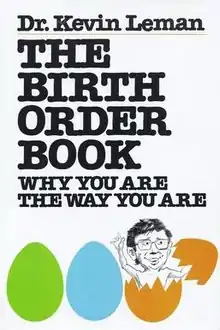The Birth Order Book
The Birth Order Book: Why You Are the Way You Are is a 1982 non-fiction book by Dr. Kevin Leman on birth order and its potential influence on personality and development.[1] An updated and revised version of the book was published in 1998 through Baker Publishing Group.[2] Leman first began studying birth orders while a student at the University of Arizona and noticing that several elements of personality were associated with a person's birth order rank.[3]
 Hardcover edition, 1980s | |
| Author | Kevin Leman |
|---|---|
| Language | English |
| Subject | Birth order |
| Published | 1982, 1998(revised) |
| Media type | Print, e-book, audiobook |
| Pages | 352 pages |
| ISBN | 1606710710 |
Synopsis
In the book, Leman details four types of personality based upon the individual's birth order: First Born, Only Child, Middle Child, and Last Born.[4] Only Child types are considered to be a form of the First Born personality types, but "in triplicate".[5]
- First Born: First born children are described as leaders that are often perfectionists that desire approval from those in charge. Leman also states that first borns are "typically aggressive" but are also often people pleasers.[5]
- Middle Child: Middle children are sometimes diverse in that they are "guaranteed to be opposite of their older sibling" and often have the feeling that they are ignored in favor of their older and younger siblings. They are also described as having personalities that lean towards being secretive and can often serve as peacemakers between their older and younger siblings.[5]
- Last Born: Leman describes the last children as "social and outgoing" but also the "most financially irresponsible of all birth orders". He also comments that they have the potential to be manipulative as well as charming.[5]
Reception
Reception for The Birth Order Book and the theories espoused in the book has been mixed,[6] with some commenting that there are "many variables" that have an effect on the personality aside from birth order.[7] In a 1995 article in the Los Angeles Times, University of Texas professor Toni Falbo commented that the modern family dynamic is "quite complex" and that "[relying] too heavily on birth order for answers is a mistake" due to families being "much more complicated now" due to the addition of step-siblings, half-siblings, and other various factors.[8]
References
- "BIRTH ORDER: IS THE OLDEST THE WISEST?". Philadelphia Inquirer. May 12, 1985. Retrieved 22 September 2013.
- "Pecking order". Atlanta Journal. December 25, 1998. Retrieved 22 September 2013.
- Harrigan, Stephen (Apr 28, 1993). "Places, Everyone". Deseret News. Retrieved 22 September 2013.
- Towarnicky, Carol (Jun 16, 1985). "Birth Order: Determine Your Destiny". Edmonton Journal. Retrieved 22 September 2013.
- Neal, Rome. "Personality Traits Linked To Birth Order". CBS News. Retrieved 22 September 2013.
- "No kidding: Birth order may not count". Erie Times-News. November 12, 2006. Retrieved 22 September 2013.
- Gray, Dawn (July 14, 1996). "Pecking Order". Retrieved 22 September 2013.
- Howard, Rebecca (February 15, 1995). "'90s FAMILY : How Birth Order Stamps Personality". LA Times. Retrieved 22 September 2013.